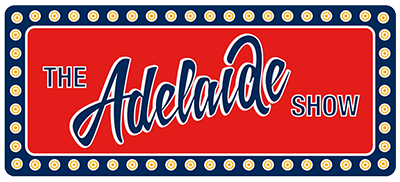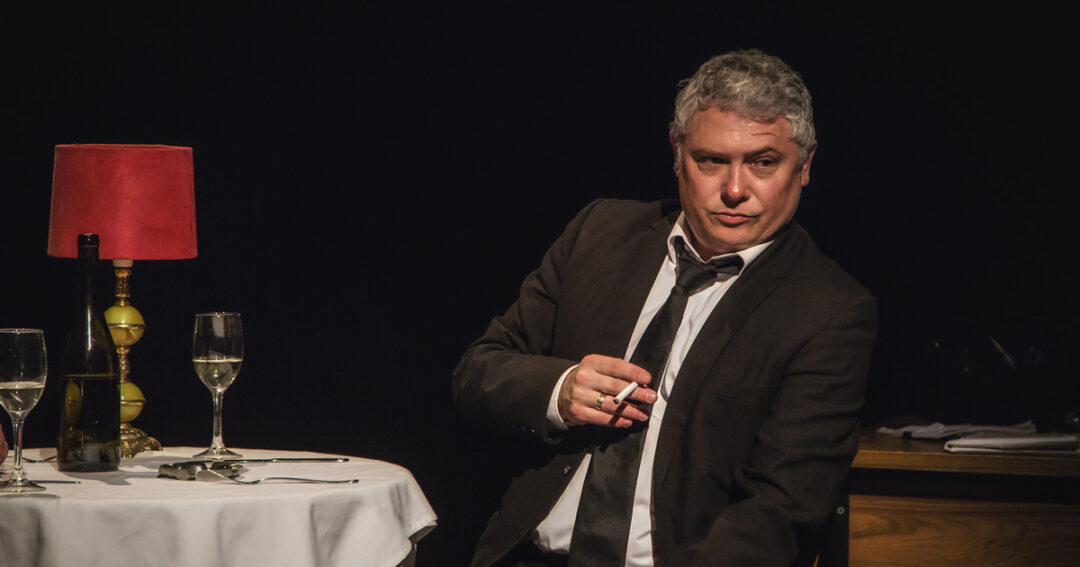Ink, by James Graham, is a smart play about a man who’s had a profoundly negative and disastrous impact on the world by channelling humankind’s base instincts in pursuit of greed and influence.
In this latest production by the University of Adelaide Theatre Guild, we get “exclusive” access to the inner workings of Rupert Murdoch’s takeover of The Sun in 1969, and the resulting clash of values between a brash Aussie, his poached, working class editor, Larry Lamb, and the staid cohort of British newspaper owners.
In Normajeane Ohlsson’s masterful set of walls plastered with tacky, tabloid front pages, and a collection of discarded, remnant filing cabinets, the Guild’s stellar cast draws us into the world of passion, disdain, hypocrisy, and desperation that Murdoch created as he aspired to, as mentioned by Larry Lamb in other sources, “a tearaway paper with lots of tits in it”.
The first act of this play is high energy and fast-paced. It opens with Rupert Murdoch (Joshua Coldwell) luring his soon-to-be editor, Larry Lamb (Bart Csorba) into a feisty, blunt exchange as they debate the elements of “story”. We soon learn that What, Where, Who, and When, are important but Why is not. Immediately, we see layers in this tale. As history has revealed, some 50+ years later, Murdoch’s lackeys and hacks and talking heads weave their own “whys” into the motivations of whomever is the “other” in their owner’s present world view.
In fact, passage by passage of the furious dialogue throughout the first act, seems laden with thought bubbles demanding further reflection. For example, at one point Murdoch opines wistfully on how we try to please our fathers harder after they die. For this audience member, it immediately triggered the thought, will this apply to Lachlan Murdoch when 92 year old Murdoch departs soon?
While Murdoch’s character always holds focus when on stage, he is, after all, the owner, the chief focal point of the story is Larry Lamb, who’s charged with curating a team of editors and writers, while dealing with the daily operational and sales challenges, in order to meet his owner’s fanciful goal of eclipsing The Daily Mirror’s dominant circulation of 5 million copies sold per day, within 12 months. At the time of the takeover, The Sun’s circulation figures were languishing around 700,000.
Csorba is captivating as Lamb, as he settles into the role of leader during a pressure cooker period; managing relationships with his management team, leading creative direction in content, and trying to stay in lock step with his maniacal boss. We are with Csorba throughout. His body, his poise, his expression; they are as explicitly measurable as the newspaper sales leaderboard on the back wall. It is a sublime performance.
Directors, Robert Bell and Rebecca Kemp, create a multi-faceted experience during the first act, with offices and clandestine meeting areas on the Little Theatre’s upper stage, above a frenetic swirling between scenes and backdrops on the main stage below. The action is driven and interwoven by a driving soundtrack, slick prop manoeuvres, and even an intriguingly quirky set of dance segues.
There is much “truth” dispersed in the dialogue, from Murdoch’s emphatic decision that he is running the newspaper as a business and not a public service, to a cautionary warning from The Daily Mirror’s editor, Hugh Cudlipp (Steve Marvanek) who notes that if you chase after the public’s appetites, it will keep growing and you will have to keep at it.
The second act changes pace and tone. If the first act were likened to the incessant “banging out” of seedy tabloid headlines, the second is more like a handwringing, Guardian-style rumination over ethics. The two key themes tackled are the kidnapping and disappearance of Muriel McKay (Kate Anolak), wife of Murdoch’s friend and deputy, Alick McKay (Joh Hartog), who was mistaken for Murdoch’s then-wife, Anna Murdoch, and the decision to run photos of topless girls on Page Three of the paper.
The direct involvement of The Sun personnel in the kidnapping, gave the paper front row access to he action and Lamb must wrestle with whether to be “decent” and follow police requests to not fuel the flames by publishing kidnapper demands and updates, or to go for the scoop. And the other dilemma is whether or not to sacrifice the standing of young girls in their communities for the quick hit of titillating the public to get more sales.
There is much territory to cover here and it’s possible that James could have done with a sub editor’s red pencil in parts, to reel in the play’s running time to less than three hours, while still delivering his philosophical punches.
That said, Ink is a must see play. It says more about the state of journalism than an essay ever could. It also holds an unflattering “mirror” up to us, the public, who continue to play into the hands of Murdoch by clicking on his clickbait and cherry picking our pinup loud mouths from his menagerie of dissent brewers.
Bravo to the Theatre Guild, in its 85th year, still showing it is a powerhouse of personnel and prowess worthy of every thinking theatre goer’s attention.
Ink, University of Adelaide Theatre Guild, at Little Theatre, October 12-22, 2023.

